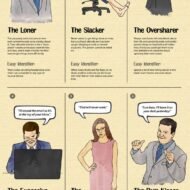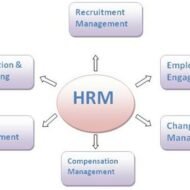Posted by Managementguru in Human Resource, Organisational behaviour
on Sep 27th, 2015 | 0 comments

This infographic from workfront is a classic representation of the 9 most despised work perosnalities you may come across as your colleagues or in any work environment. To deal with rude people, you first have to understand their behavioral pattern in order to make the work place amiable. Despised Work Personalities Visit Human Resource Development to save pins more of this kind. How does human behavior influence the work place ? Before delving into the solutions for handling difficult co-workers , I would like to present a small statistical summary on how does human behavior influence the work place. Humans are at the heart of a company. Their behavior not only influences its success, but also its failure. How does one understand them? Or know that there is a problem? The avearge employee spends about 15 hours a month criticizing or complaining about their boss.Studies have found highly engaged employees were 87% less likely to leave their companies than their engaged counter parts.Highly engaged employees also bring out the most creative ideas than their 3% of the less engaged .Companies with highly engaged staff report employees taking an average of 7 absence days per year against 14 days in low engagement companies.About 84% of the managers do not have the know-how of measuring productivity 4 Mantras to Handle Difficult Co-Workers in the Office Remain calm and disciplinedUnderstand the opposition’s perspectiveDon’t take anything personallyAcquire constant skills to deal with difficult people How to Deal With Rude People Don’t lose your cool – Get a hold of your anger firstConfront- only if the person is way out of lineDon’t expect the rude behavior to change any soon – their behavior is suchUse a selective respsonse system – Acknowledge postive responses while ignoring rude commnets.Ask the person how you can help – Help them release their pent up emotionsRaise your consciousness where you can’t be affected.Think about the times when you were rude to others.Opt out of interaction – You don’t have to get involvedConnect with people who can help youUnderstand why the person is rude – and then address those...

Posted by Managementguru in Business Management, Change management, Human Resource
on Jun 25th, 2014 | 0 comments

Smith et al. describe management as “Making Organizations perform”. Management is concerned with Individuals who are delegated authority to manage others – Let me call them ‘People with Power’. Activities for achieving goals – ‘Real Action Plans’. A body of knowledge represented by theories and frameworks about people and organizations – ‘Policy Framework’. What do managers do? As we all know they are involved in general management functions like Forecasting Planning Organizing Motivating Co-ordinating Controlling Are you aware of the ‘hidden’ dimensions of a manager’s job? Modern management theories, although highlighting the complexity of the role, have yet to provide sufficient empirical research and advice into key areas that enable both managers and organizations to increase their effectiveness. For example Dealing competently with organizational politics (“You can ignore it, but it won’t go away” – This is how surveyed employees said they viewed office politics) Successfully managing change (Adaptability is about the powerful difference between adapting to cope and adapting to win) Controlling ethical issues and demands (It takes 20 years to build a reputation and five minutes to ruin it. If you think about that, you’ll do things differently.) Developing the role of women managers (Women can be better managers than men because they tend to be more conservative and do their homework. Men tend to take more risk without the research) Ensuring personal ‘survival’ and career success in organizations (A successful man is who lays a firm foundation with the bricks others throw at him.) Safeguarding personal health in a stressful environment (Manage stress before it manages you). How to achieve a more comprehensive view of development? Frameworks for setting, linking, and balancing individual and organizational objectives. Systems for identifying and selecting managers Structures to support, motivate and reward Plans to enable career progression Mechanisms to measure and evaluate performance. HRM and Management Development Human resource management as the name suggests is about the effective management of people in organizations. HRM involves the integration of people with business goals and strategies HRM views people as assets to be developed and utilized in a productive way rather than costs to be minimized or eliminated. The philosophies, ideologies, values and beliefs of management that operate and dominate within the organization have an impact on people management. The practices, policies and management styles that managers employ in their managerial role also align people’s behavior towards organizational goals. Senior managers determine the extent to which people are integrated into the organization’s strategic plans. They set the agenda and create the culture climate of prevailing values, attitudes and behavior. Middle and junior managers translate and ‘operationalize’ broader human resource strategies and policies. They give HRM its meaning and reality. It is their perfect management style and actual behavior that decided how the human resources is deployed and managed and thus what people experience as human resource management. The way managers themselves are managed and developed is a significant influencing factor in the way people are subsequently...




